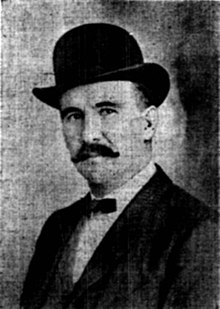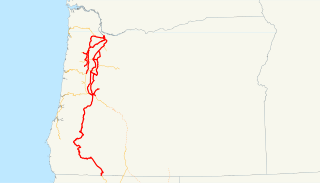
The Oregon and California Railroad was formed from the Oregon Central Railroad when it was the first to operate a 20-mile (32 km) stretch south of Portland in 1869. This qualified the railroad for land grants in California, whereupon the name of the railroad soon changed to Oregon & California Rail Road Company. In 1887, the line was completed over Siskiyou Summit, and the Southern Pacific Railroad assumed control of the railroad, although it was not officially sold to Southern Pacific until January 3, 1927. This route was eventually spun off from the Southern Pacific as the Central Oregon and Pacific Railroad.

Wester Shadric Cooley was a Republican politician and rancher from Oregon. He was a U.S. Representative from Oregon's 2nd congressional district for the 1995–1997 term.
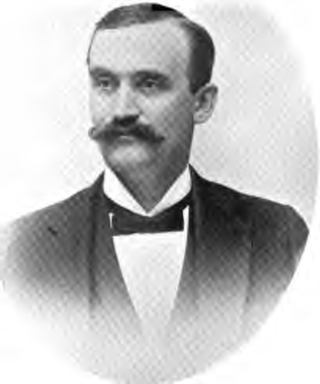
John Hicklin Hall was a politician and attorney in the U.S. state of Oregon. A native of the Portland area, he served in the Oregon House of Representatives in the early 1890s before appointment as the United States District Attorney for Oregon. As the federal prosecutor, he became involved in the Oregon land fraud scandal, in which several high-profile public officials conspired to defraud the government in acquiring land for a private entity. Hall was convicted, but subsequently pardoned, for failing to prosecute some of the participants.
Pennoyer v. Neff, 95 U.S. 714 (1878) was a decision by the Supreme Court of the United States in which the Court held that a state court can only exert personal jurisdiction over a party domiciled out-of-state if that party is served with process while physically present within the state. More importantly, the court imposed a procedural limit on quasi in rem jurisdiction over property located within the state; it would have to be "brought under the control of the court" at the time the suit commenced otherwise quasi in rem jurisdiction would remain unavailable.
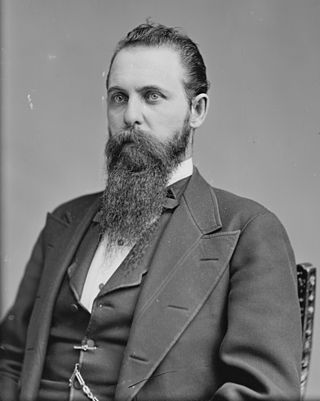
John Hipple Mitchell was an American lawyer, politician, and convicted criminal. He served as a Republican United States Senator from Oregon on three occasions between 1873 and 1905. He also served as president of the state senate, did the initial legal work involved in the dispute that led to the landmark Supreme Court case of Pennoyer v. Neff, and later was involved with the Oregon land fraud scandal, for which he was indicted and convicted while a sitting U.S. Senator. He is one of twelve U.S. Senators indicted while in office, and one of five convicted.

Francis Joseph Heney was an American lawyer, judge, and politician. Heney is known for killing an opposing plaintiff in self-defense and for being shot in the head by a prospective juror during the San Francisco graft trials. In 1891, while an attorney in Tucson, Arizona Territory, he defended the abused wife of John C. Handy. Handy attacked Heney, who shot and killed Handy. Heney later served as Attorney General of the Arizona Territory between 1893 and 1895. He was the chief prosecutor of the Oregon Land Fraud scandal from 1904 to 1910 and served as US District Attorney for the District of Oregon, from January 9 to December 3, 1905. He prosecuted corrupt San Francisco politicians, from 1906 to 1908.

The Oregon land fraud scandal of the early 20th century involved U.S. government land grants in the U.S. state of Oregon being illegally obtained with the assistance of public officials. Most of Oregon's U.S. congressional delegation received indictments in the case: U.S. Senator John H. Mitchell and U.S. Representatives John N. Williamson and Binger Hermann, with Senator Charles William Fulton singularly uninvolved.

Abraham Walter Lafferty was a U.S. Representative from the state of Oregon. Lafferty spent the majority of his career both as a legislator and as an attorney attempting to have millions of acres of land previously owned by the Oregon and California Railroad come under Oregon state control, rather than the control of the U.S. federal government.

Jacob Kamm was a prominent early transportation businessman in Oregon, USA.

William Sargent Ladd was an American politician and businessman in Oregon. He twice served as Portland, Oregon's mayor in the 1850s. A native of Vermont, he was a prominent figure in the early development of Portland, and co-founded the first bank in the state in 1859. Ladd also built the first brick building in Portland and was a noted philanthropist. Part of his former estate, the Ladd Carriage House, is on the National Register of Historic Places.
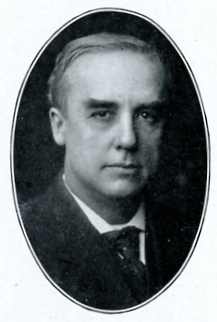
Samuel Bruce Huston was an American politician and lawyer in Oregon. Originally a Democrat and later a Republican, he served in both chambers of the Oregon Legislative Assembly and was twice the mayor of Hillsboro, Oregon. A native of Indiana, he served in the state senate as a Democrat from one county his first term, but moved and changed parties by his second term 20 years later.

Winlock W. Steiwer was an American banker, rancher, and politician in the state of Oregon. Born in the Willamette Valley, he made his name in Eastern Oregon as the founder of a bank and as county judge. A Republican, he twice served in the Oregon State Senate. He pleaded guilty in the Oregon land fraud scandal of the early 1900s.
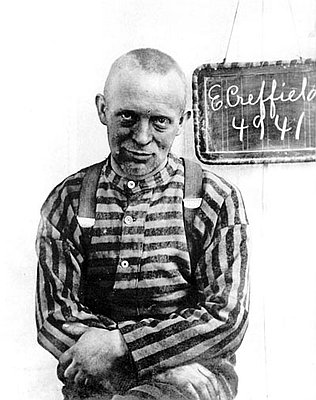
Franz Edmund Creffield, commonly known as Edmund Creffield and by the pseudonym Joshua, was a German-American religious leader who founded a movement in Corvallis, Oregon, that became known locally as the "Holy Rollers". The movement, mainly popular among women, was widely regarded as a cult. Creffield, who believed himself the second coming of Jesus, had a number of run-ins with the authorities and the local citizenry over the next several years, often stemming from his relations with his female followers and his increasingly erratic behavior.
The Portland vice scandal refers to the discovery in November 1912 of a deviant group in the U.S. city of Portland, Oregon. Nearly 70 men were charged, and three were convicted by jury; the Oregon Supreme Court then reversed the convictions on legal technicalities.
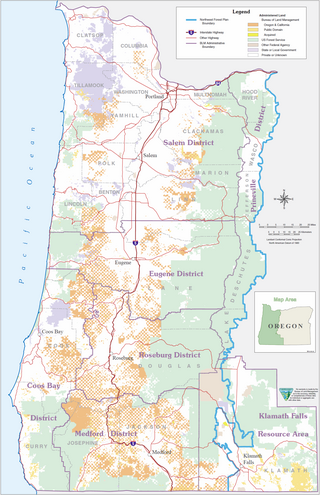
The Oregon and California Railroad Revested Lands, are approximately 2,600,000 acres (1,100,000 ha) of land located in eighteen counties of western Oregon. Originally granted to the Oregon & California Railroad to build a railroad between Portland, Oregon and San Francisco, California, the land was reconveyed to the United States government by act of Congress in 1916 and is currently managed by the United States Bureau of Land Management.
Lionel D. Deane was an architect in the United States and later part of Brooklyn, New York's art scene. He was born in Nova Scotia, Canada. He is known for his architectural work in northern California and the Pacific Northwest. His career took a hit when he was caught up in a crackdown against Portland's Gay community in 1912.

Willard N. Jones (1869–?) was a civil engineer and timber dealer in the U.S. state of Oregon. He served as a Republican in the Oregon Legislative Assembly in 1903, and was convicted of fraud in 1906.
Uriah Francis Abshier was a state legislator from the state of Oregon. He served one two-year term in the Oregon House of Representatives as a Republican legislator, representing a large rural district in south-central Oregon. He was the postmaster for Silver Lake, Oregon and owned ranch property near that town. Later, he ran a hardware store in Centerville, Washington.

George Clayton Brownell was an American politician and attorney from Oregon City, Oregon. He was a conservative Republican who represented Clackamas County in both of Oregon's legislative chambers. He served three four-year terms in the Oregon State Senate and was senate president from 1903 through 1904. Brownell was defeated for re-election after he was implicated in a land fraud scheme. However, he was later exonerated when one of the convicted fraudsters admitted in court that he had forged Brownell's name on the incriminating documents without Brownell's knowledge or consent. Brownell remained very popular in Clackamas County throughout his life. He was elected mayor of Oregon City in 1910 and later served a two-year term in the Oregon House of Representatives.
